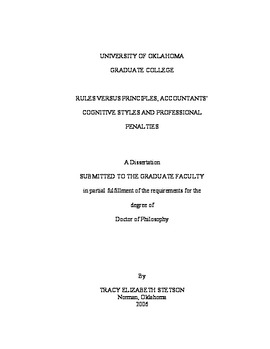| dc.contributor.advisor | Ghosh, Dipankar, | en_US |
| dc.contributor.advisor | Crain, Terry L., | en_US |
| dc.contributor.author | Stetson, Tracy Elizabeth. | en_US |
| dc.date.accessioned | 2013-08-16T12:20:02Z | |
| dc.date.available | 2013-08-16T12:20:02Z | |
| dc.date.issued | 2006 | en_US |
| dc.identifier.uri | https://hdl.handle.net/11244/979 | |
| dc.description.abstract | While 40.2% of the general U.S. population are Thinkers (T), 70.5% of accounting professionals are Thinkers (T). While 20.3% of the general U.S. population are STJs, 39.1% of accounting professionals are STJs and the STJ cognitive style combination is the most prevalent cognitive style combination for accounting professionals. Thus, this study provides some evidence that the cognitive style preferences materially more prevalent among accounting professionals than the general U.S. population may lead to more willingness to approve an inappropriately aggressive transaction under rules but not under principles. | en_US |
| dc.description.abstract | This study examined the effect of accountants' cognitive styles and the severity of potential professional penalties under rules-based versus principles-based standards in the context of client pressure to approve of an inappropriately aggressive transaction. Cognitive style was operationalized using the Myers-Briggs Type Indicator. With respect to the individual elements of cognitive style, the Perceiving (SN) mental function was not significant and did not interact significantly with standard precision (rules-based versus principles-based standards, or rules versus principles). The Judging (TF) mental function interacted marginally significantly with standard precision and was significant under rules but not under principles, with Thinkers (T) under rules exhibiting greater aggressiveness (21.5% mean chance of approving an inappropriately aggressive transaction versus 9.00%, 12.73% and 13.64%). This differential effect of the Judging (TF) mental function may be enhanced if the Thinker (T) is also a Sensor (S) and a Judging (J) type (STJ) (29% mean chance of approving an inappropriately aggressive transaction for STJs versus 21.5% chance of doing so for Thinkers (T)). | en_US |
| dc.description.abstract | Surprisingly, under both rules-based and principles-based standards, greater aggressiveness was indicated when potential professional penalties were high (three times the fee obtained for the opinion) rather than low ($250). Thus, this study provides some evidence that heightening the monetary amount of potential professional penalties may not lower and may even increase the willingness of accountants to approve an aggressive transaction under either rules or principles. | en_US |
| dc.format.extent | vi, 87 leaves : | en_US |
| dc.subject | Accountants United States Psychology. | en_US |
| dc.subject | Business Administration, Accounting. | en_US |
| dc.subject | Psychology, Personality. | en_US |
| dc.subject | Law. | en_US |
| dc.title | Rules versus principles, accountants' cognitive styles and professional penalties. | en_US |
| dc.type | Thesis | en_US |
| dc.thesis.degree | Ph.D. | en_US |
| dc.thesis.degreeDiscipline | Michael F. Price College of Business | en_US |
| dc.note | Advisers: Terry L. Crain; Dipankar Ghosh. | en_US |
| dc.note | Source: Dissertation Abstracts International, Volume: 67-01, Section: A, page: 0247. | en_US |
| ou.identifier | (UMI)AAI3206889 | en_US |
| ou.group | Michael F. Price College of Business | |
